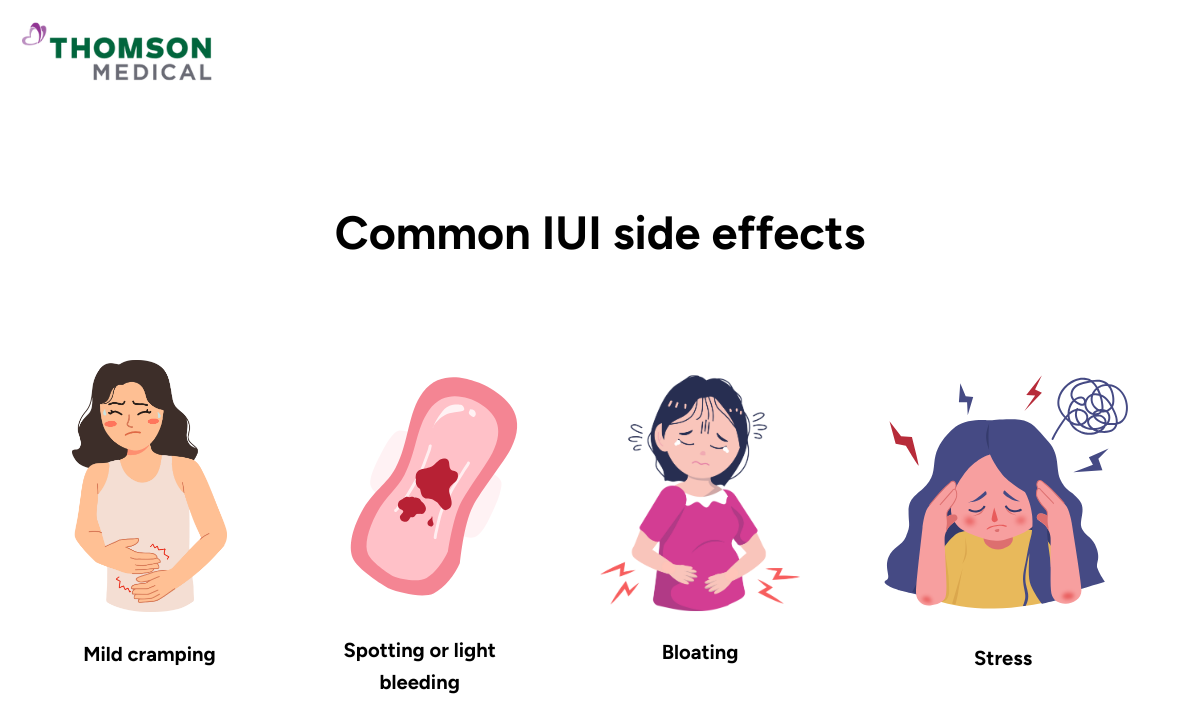While intrauterine insemination (IUI) is generally considered a safe, minimally invasive fertility treatment, mild side effects can still occur due to the insertion of a catheter into the womb during the procedure. However, fertility medications or issues in the implantation process can also cause side effects to occur.
Understanding these side effects can help you feel more at ease during your IUI journey and allow you to recognise when you should consult your fertility specialists for medical attention.
Common IUI side effects

During IUI treatment, a thin, flexible tube known as a catheter is inserted into your womb through the cervix to deposit your partner's sperm. This procedure shortens the distance that the sperm need to swim to reach the egg in the fallopian tubes.
While it's a safe procedure, you may experience some mild side effects, such as:
Cramping or mild pelvic discomfort (similar to menstrual cramps)
Light spotting or bleeding
Bloating or pressure in the lower abdomen
Emotional stress or anxiety
You may also experience side effects if fertilisation and implantation take place. As the fertilised egg travels to the womb and implants itself in the uterine lining, it can cause hormonal changes, which can lead to:
Cramping
Thicker cervical mucus
Nausea or vomiting (morning sickness)
Breast tenderness
Spotting
Headaches and fatigue
Emotional fluctuations
While these symptoms may indicate a successful outcome, they don’t serve as a confirmation of pregnancy. This is because some symptoms of a successful IUI are similar to premenstrual signs or common IUI treatment side effects, making it difficult to determine the outcome based on symptoms alone.
To ensure your symptoms are normal or indicative of a successful IUI, rather than something more serious, schedule an appointment with Thomson Fertility Centre. Our fertility specialists can help diagnose your symptoms and provide personalised care.
Are there any side effects of IUI medication?
During your IUI treatment, your fertility specialists may recommend fertility drugs to help stimulate your ovaries and promote the development and release of eggs. By stimulating the ovaries, fertility drugs can increase the number of eggs released, thus improving the odds of conception.
However, these medications can sometimes cause side effects. Here are the most commonly used fertility medicines and their side effects.
Clomiphene citrate (Clomid)
Clomid is an oral medication that tricks your brain into thinking that your oestrogen levels are lower than they actually are. When your brain receives this signal, your pituitary gland releases more FSH (follicle-stimulating hormone) and LH (luteinising hormone). These hormones then stimulate your ovaries to develop and release eggs.
Clomid is typically administered early in the menstrual cycle, usually between days 3-7 or 5-9, to stimulate follicle development prior to insemination. By encouraging your ovaries to produce mature eggs, Clomid helps to ensure that ovulation occurs at the optimal time for IUI. Although beneficial, this fertility medication can cause side effects such as:
Hot flashes
Mood swings or irritability
Breast tenderness
Bloating
Headaches
Increased the risk of multiple pregnancies
Rarely, Clomid can also cause temporary changes in vision, such as blurred vision, seeing spots or being sensitive to light. If these vision issues occur, please contact your doctor immediately.
Human chorionic gonadotropin (hCG)
hCG is a hormone crucial in fertility treatments because it mimics luteinising hormone (LH), which triggers the maturation and release of a mature egg during ovulation.
After ovarian stimulation with gonadotropin injections (which are usually started early in the menstrual cycle, around days 2-4, and continued for 7-14 days), hCG is given as a "trigger shot" once at least one follicle reaches maturity.
The hCG trigger shot induces ovulation at the optimal time, with intrauterine insemination (IUI) typically scheduled 24-36 hours afterward to coincide with egg release.
While this fertility medicine is generally well-tolerated, like all medications, it may cause side effects, including:
Hot flushes
Headaches
Mild bloating or pelvic discomfort
Breast tenderness
Mood swings or irritability
Mild pelvic cramping or spotting
Slight redness or soreness at the injection site
Increased risk of multiple pregnancies (twins or more)
Ovarian Hyperstimulation Syndrome (OHSS)
Your fertility specialists will carefully monitor your response to this fertility medication and adjust dosages to minimise these effects and support a safe and effective treatment process.
Progesterone supplements
Following your IUI procedure, to increase the success rates of the treatment, your doctor may ask you to take progesterone supplements for at least two weeks after the procedure.
After these two weeks, you will take a pregnancy test to determine whether conception has occurred. If you are pregnant, you will continue taking the supplements until you are about 10 to 12 weeks into your pregnancy.
Progesterone supplements are used to help maintain the uterine lining, support the developing embryo during the early stages of pregnancy and minimise the risk of miscarriage in the early stages of pregnancy. This support continues until the placenta can produce enough progesterone on its own.
While progesterone plays an important role in fertility treatment, it interacts with multiple other systems in the body, which can lead to side effects including:
Breast tenderness or swelling
Bloating and gastrointestinal discomfort
Fatigue, mood changes, and sleepiness
Mild cramping and headaches
Vaginal discharge or leakage
Our fertility specialists
Loading...
Are there any serious side effects of IUI?
Although IUI is generally considered a safe method of artificial insemination, rare but serious side effects can occur, which are often linked to fertility medications or complications from the implantation process. Here are some of the serious side effects that can result from IUI.
Multiple pregnancies
If your IUI treatment uses ovulation-stimulating drugs, such as Clomid or hCG, more than one egg may be released and fertilised. If this happens, you could end up pregnant with twins or even triplets.
While you may not have a problem carrying twins, your doctor will monitor your egg growth by using transvaginal ultrasound scans and may recommend cancelling the IUI procedure if too many eggs develop. This is because multiple pregnancies carry risks such as:
Preterm birth
Low birth weight
Pregnancy diabetes and hypertension
Higher risk of miscarriage
Higher likelihood of C-section
Ectopic pregnancy
An ectopic pregnancy occurs when a fertilised egg implants and grows outside of the womb, most commonly in the fallopian tubes. It can be caused by blockages that prevent the egg from moving down the tube towards the womb. These blockages can be caused by previous infections, surgery, or other anatomical conditions.
This condition can cause symptoms such as:
Sharp or stabbing pain
Urinary or bowel symptoms
Vaginal bleeding
Breast tenderness
Dizziness or fainting
Because the egg grows in the place it's not supposed to be, it can cause the fallopian tube to rupture as the pregnancy progresses. When a tube bursts, you may feel sudden, severe abdominal pain, along with shoulder pain, feel very light-headed, or even faint. This is a medical emergency and requires immediate attention.
Ovarian Hyperstimulation Syndrome (OHSS)
OHSS is an exaggerated response to fertility medications, particularly injectable hCG, which stimulates the development of eggs in the ovaries. It causes the ovaries to swell and leak fluid into the abdomen.
This condition can cause symptoms such as:
Bloating
Mild abdominal pain
Nausea
Most of the time, OHSS is mild and goes away on its own. But you should keep an eye out for indications that could mean a more serious condition that needs immediate medical attention and hospital care. Some examples are:
Rapid weight gain
Severe bloating or abdominal swelling
Persistent vomiting or diarrhoea after IUI
Decreased urination
Shortness of breath
If you experience any of the aforementioned symptoms, particularly following IUI with fertility medications, and the symptoms persist or worsen after a few days, schedule an appointment with a fertility specialist at Thomson Fertility Centre for further diagnosis.
How to cope with IUI treatment side effects

It’s normal to feel anxious when you experience an IUI side effect, especially if you're worried about how it might affect your chances of success. However, looking after your emotional and physical health during this time can have a positive impact on your overall well-being.
Here are a few things you could do to help you cope through this difficult time:
Track symptoms daily to help distinguish between IUI side effects, menstrual symptoms, and potentially early pregnancy signs.
Maintain healthy lifestyle habits, including eating a balanced and nutritious diet, maintaining a healthy weight, reducing alcohol intake, staying hydrated, and exercising regularly.
If your doctor approves, you can use heating pads to help reduce cramping pain.
Take all prescribed medications as directed by your fertility specialist.
Aim for 7-9 hours of sleep each night, as a good night's rest can help support your overall health and wellbeing.
Practise self-care activities such as yoga, journaling or meditation to support your mental health.
Talk openly and honestly with your partner, which can help you both to work together and support each other.
Contact your doctor immediately if you experience severe pain, a fever, heavy bleeding or any worsening symptoms.
FAQ
Can I have a healthy baby with IUI?
Yes, IUI can help couples conceive and have healthy pregnancies, particularly when fertility issues are mild or related to ovulation or sperm quality. Although success rates depend on factors such as age and fertility issues, IUI is a safe and popular option for many couples.
Can IUI damage the womb?
IUI is considered a safe procedure which rarely causes any damage to the womb. Mild irritation, light spotting or brief cramping may occur afterwards, but these symptoms are usually temporary and resolve on their own.
Is intrauterine pregnancy good or bad?
An intrauterine pregnancy is the desired outcome of IUI and all fertility treatments, as it means the embryo has implanted correctly inside the womb. This is considered a healthy and positive outcome.
Can IUI cause allergic reactions?
Although allergic reactions to IUI itself are rare, allergies can occasionally occur in response to fertility medications. If you experience itching, swelling, breathing difficulties, or any other sudden symptoms after treatment, contact your doctor immediately.
How do I know if my side effects are serious?
Call your doctor if you experience any of the following symptoms after IUI:
Severe abdominal pain
Heavy vaginal bleeding
High fever
Fainting or dizziness
Difficulty breathing
Can I confuse IUI side effects with early pregnancy symptoms?
Yes, it’s common to experience symptoms such as bloating, breast tenderness, or fatigue after IUI, either due to the medication or due to changes associated with early pregnancy. As these signs can be very similar, the only reliable way to confirm pregnancy is to take a pregnancy test after two weeks.
The information provided is for general guidance only and should not be considered as medical advice. For a personalised fertility consultation and tailored advice, schedule an appointment with Thomson Fertility Centre today.
For more information, contact us:
Thomson Fertility
- Paragon: 6252 7766
Thomson Specialists (Women's Health)
Request an Appointment